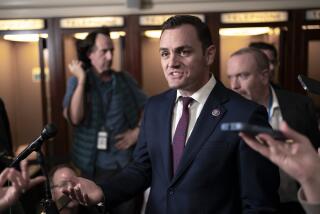His ‘No’ Vote on Terror Bill Earns Respect
- Share via
WASHINGTON — He wants to curtail the influence of deep-pocket donors on Capitol Hill. He doesn’t think Congress deserves a pay raise when the economy is tanking. And he cast the lone vote in the Senate against a major crime bill that everyone else hailed as the antidote to terrorism.
Sen. Russell D. Feingold is definitely not out to win any popularity contests among his peers. Yet the Wisconsin Democrat remains respected by lawmakers of both major parties as a colleague who’s hard to pigeonhole--a liberal, generally; a Populist, often; but, on some key occasions, a friend to conservatives.
As for the public, Feingold said Tuesday that he has been surprised by the reaction since he declared his opposition to the counter-terrorism bill known as the USA Patriot Act. The vote in the Senate last week may have been 98 to 1, Feingold said, but constituent response is running nearly 2 to 1 in favor of his position.
“It’s amazing how much support I’ve received on this, way beyond anything I ever dreamed,” Feingold said. “I’m almost startled.”
The bill, signed into law Friday by President Bush, expands police surveillance powers in numerous ways to help catch or thwart suspected terrorists. In opposing the bill as an unjustified infringement on civil liberties, Feingold cited provisions that would allow police to search homes more often without notifying property owners beforehand--a power known as “sneak and peek”--and would give federal agents new authority to eavesdrop on more telephone conversations by using a looser statute that applies to foreign intelligence gathering. It has lower thresholds for court approval than would apply in ordinary criminal investigations.
Amid the war on terrorism launched in response to the Sept. 11 attacks, voting against an administration-backed counter-terrorism bill is not easy. That is a lesson Rep. Barbara Lee (D-Oakland) learned after she cast the only vote in Congress on Sept. 14 against a resolution authorizing Bush to use military force to attack terrorists. But she too got support from liberal constituents at home in her East Bay Area district.
Unlike Lee, Feingold was not alone. Sixty-six members of the House also voted against the crime bill. Still, he said he had seen some e-mail from constituent critics using “stronger, saltier language than we usually receive.”
But Feingold also got support from unexpected quarters. Editorialists across Wisconsin, conservative and liberal alike, supported his efforts to slow consideration of the legislation.
“Whether you agree with him or not, Feingold deserves praise for taking on this tough cause when nobody else would,” wrote the Waukesha Freeman, a newspaper serving a strongly Republican area in the suburbs of Milwaukee. “We agree with him. And now we share his fears for a future ripe for abuse of the citizenry in the name of protecting them.”
Feingold, 48, a two-term senator up for reelection in 2004, is best known for co-sponsoring legislation with Sen. John McCain (R-Ariz.) to ban the unlimited donations to political parties known as soft money. He also frequently lambastes spending bills for including pork-barrel projects to help lawmakers at home. Last week, he tried--but failed--to force the Senate to vote on whether lawmakers should be allowed to receive a $4,900 automatic pay raise in January. None of those positions endears him especially to his colleagues.
But as chairman of the Senate Judiciary subcommittee on the Constitution, Feingold is respected on both sides of the aisle on crime issues. In January, he was the only Democrat to vote in committee for the nomination of John Ashcroft as attorney general--a stand that earned him considerable points with Republicans.
“He’s a man of conscience,” said Sen. Larry E. Craig (R-Idaho), chairman of the Senate Republican Policy Committee. “You won’t find me criticizing him too hard.”
Said Sen. Jon Kyl (R-Ariz.), who serves with Feingold on the judiciary panel: “I disagree with him, but I respect him. He’s a liberal, I’m a conservative, but so what? He plays a very constructive role.”
More to Read
Get the L.A. Times Politics newsletter
Deeply reported insights into legislation, politics and policy from Sacramento, Washington and beyond. In your inbox twice per week.
You may occasionally receive promotional content from the Los Angeles Times.










